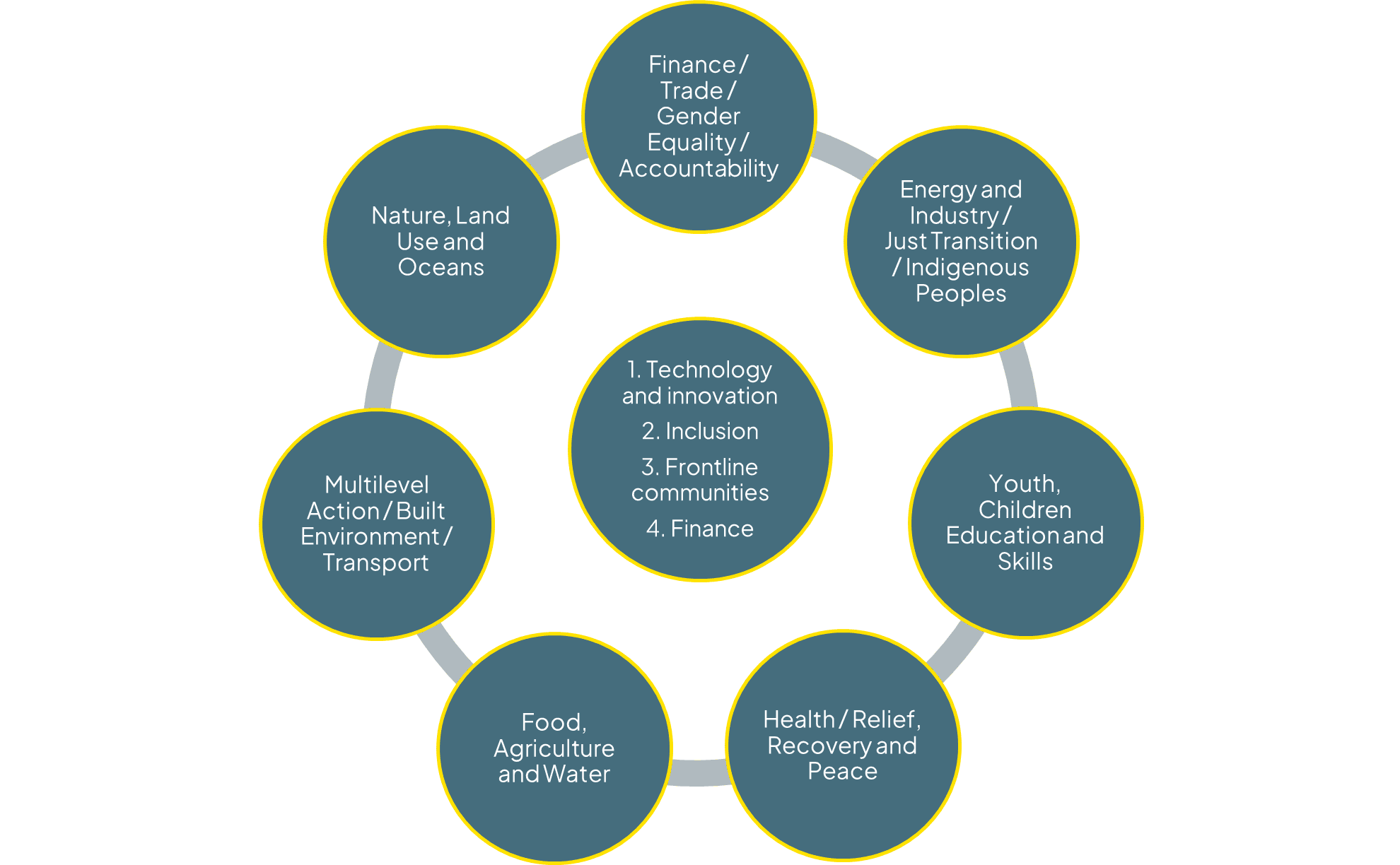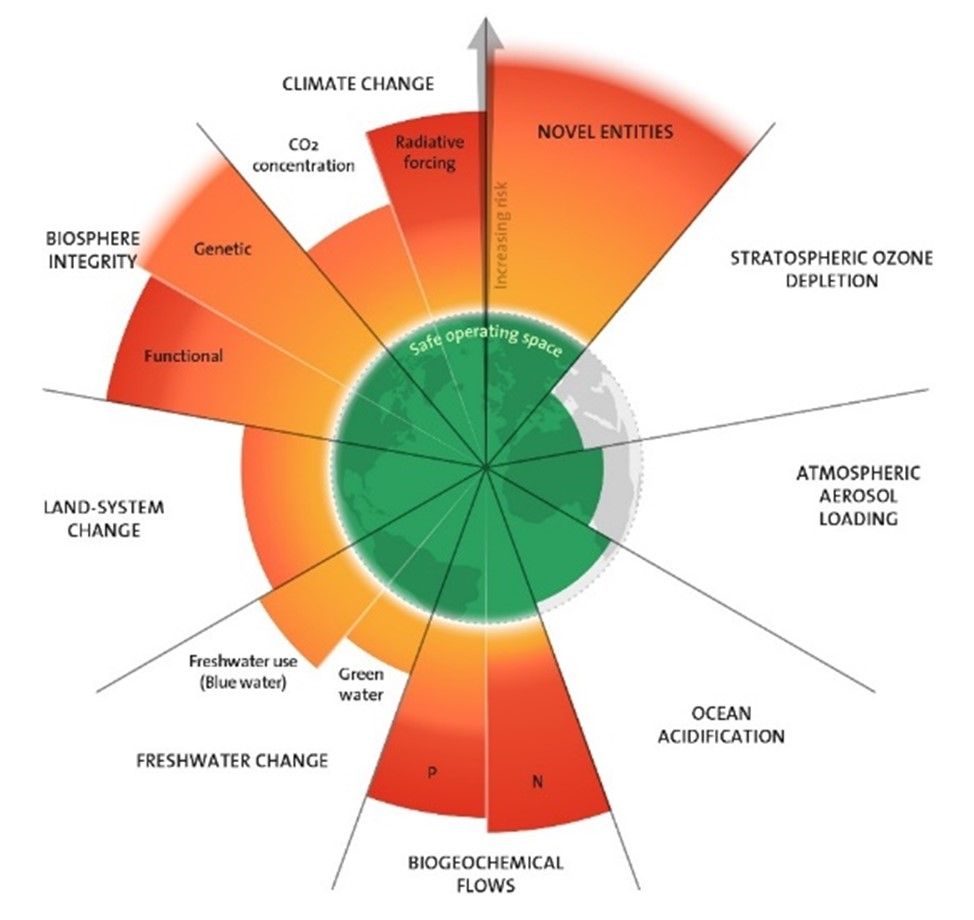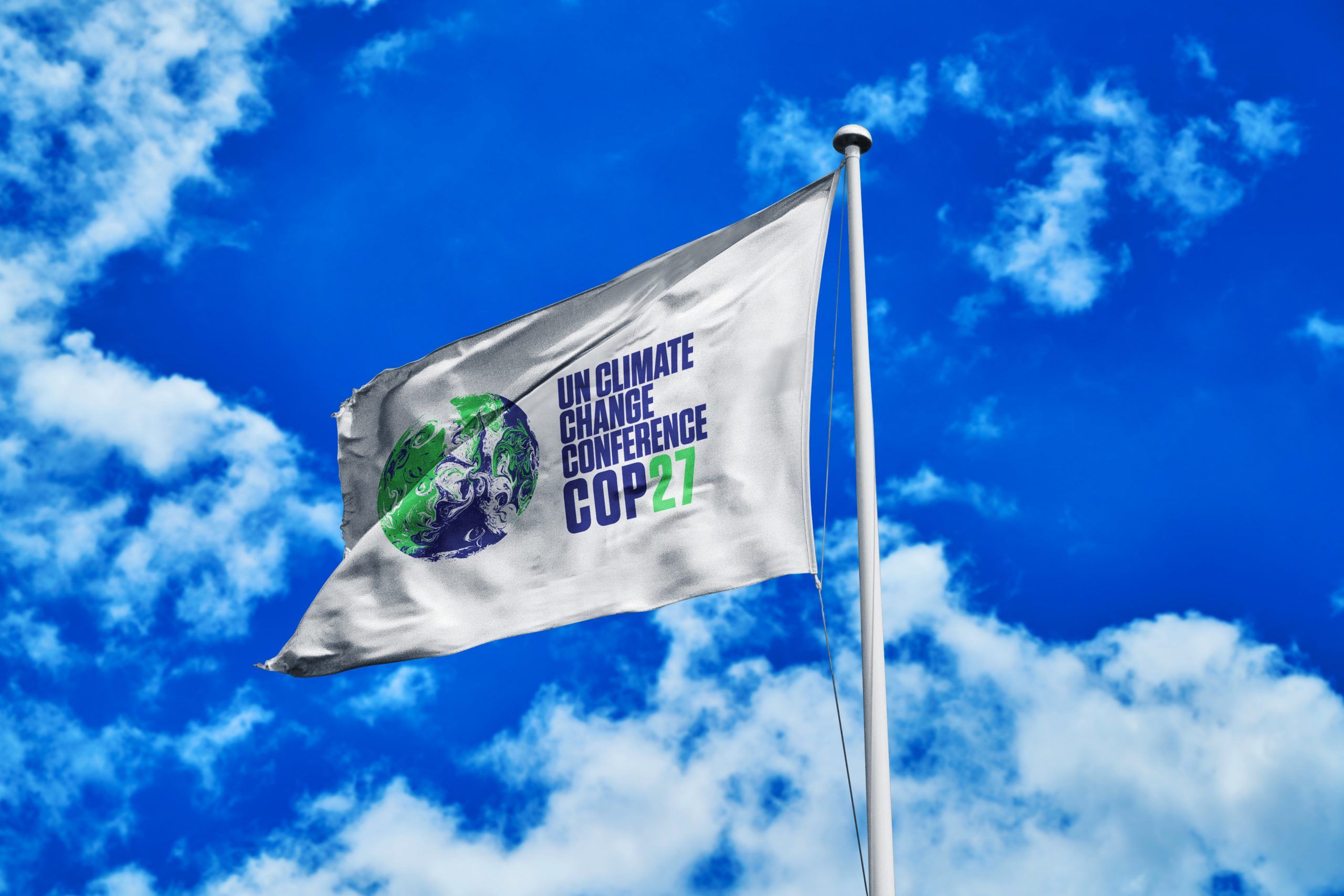The upcoming 28th Conference of the Parties (COP28) to the United Nations Framework Convention on Climate Change (UNFCCC) provides a critical platform for climate action. The world stands at a midpoint between the adoption of The Paris Agreement in 2015 and the crucial year 2030, where greenhouse gas (GHG) emissions must decline by 43% to limit global warming to 1.5°C. This international conference provides a key opportunity to drive substantial progress bringing together global political leaders and non-state actors to drive climate action and ensure the world is on track to deliver the goals of the Paris Agreement.
What is COP28?
The Conference of the Parties (COP) is held annually to address and accelerate climate action at global, regional, national and local levels. High-level country representatives, or ‘Parties’ to the UNFCCC, monitor, review and strengthen implementation of the Paris Agreement. They also collaborate to deliver policies for a net-zero and just future. COP28 will bring together almost 200 nations in Dubai, United Arab Emirates, between 30 November and 12 December 2023.
COP28 is particularly significant because the Parties will consider findings from the first UN Global Stocktake. The Global Stocktake assesses progress on climate action over the past five years and whether action taken by countries aligns with the goals of the Paris Agreement. Its first Synthesis report, published on 8 September 2023, highlights a persistent ‘emissions gap’ noting that current climate commitments are not in line with a 1.5⁰C pathway. Moreover, the United Nations Environmental Programme (UNEP) explains that we are on track for an expected global average temperature increase of 2.5 - 2.9⁰C above industrial levels by 2100. To reach the 1.5⁰C goal, the report points to a system-wide transformation, including a shift in transport and industry practices, scaling of renewable energy solutions, phasing out unabated fossil fuels, reducing non-CO2 emissions like methane, conserving nature and embracing sustainable agriculture. The report also calls for a significant increase in adaptation support and mechanisms to address loss and damage from climate change, particularly for vulnerable communities.
Key messages for board directors
- Policy outcomes from COP28 will be important for board-level decision making. Whilst businesses are driving climate action on many fronts, they need certainty and reassurance that governments are also working on policy measures that will support the delivery of a net-zero future. The outcomes of negotiations at COP28 will send important signals to industrial markets which may influence strategic decisions on investment and decarbonisation pathways. Some outcomes may translate into national and regional regulation, which could have implications for corporate governance processes. The following points detail the most relevant policy discussion for board directors.
- A significant increase in global climate ambition is needed to close the ‘emissions gap.’ Decarbonising the global energy system is key. Since no agreement on fossil fuel phase out was reached at COP27, these discussions will continue and the scaling up of renewable energy will also be an important topic. COP28 president, Dr Sultan Al Jaber, plans to involve energy companies in the discussions for the first time. Al Jaber is the chief executive of the UAE’s national oil company and has openly supported a fossil fuel ‘phase down’.
- Board directors should consider how the energy transition will affect the organisation(s) they represent including how it may influence the net-zero pathway(s).
- Board directors may also reflect on whether their organisation(s) could play a more active role, for example by supporting the We Mean Business Coalition’s ‘Fossil to Clean’ campaign launched during Climate Week NYC.
- Unlocking finance for climate mitigation and adaptation measures that support a just and equitable transition is a priority. Discussions on voluntary carbon markets, green capital markets and green bonds will be part of the official negotiations, with a significant emphasis on unlocking finance for countries most vulnerable to the impacts of climate change. Discussions to consolidate the ‘Loss and Damage Fund’ established at COP27 are also a priority.
- Board directors may consider whether their organisation(s) could contribute towards blended financing solutions in emerging economies, particularly in countries where the organisation has an operational presence.
- Board directors may also wish to reflect on how the loss and damage fund will impact communities where the organisation(s) has business operations. Allocation of these funds may have further implications on the associated climate risks and opportunities for the organisation.
- Decarbonisation of supply chains is a key topic. Multilevel discussions will include an emphasis on sustainable trade throughout whole supply chains. In particular, this will address large corporations which play an important role in decarbonising supply chains.
- Board directors are advised to understand the proportion of Scope 3 (value chain upstream and downstream) emissions in their organisation’s GHG emissions portfolio, to follow, and be ready to act upon, relevant COP28 decisions and progress on the supply chain topic. Scope 3 emissions are explained in our Value Chain briefing.
- Transition plans will also be an important topic at COP28. Initial conversations at the Climate Ambition Summit in September focused on transition plans in the context of the UN’s Integrity Matters report. The purpose is to ensure credibility and accountability of climate commitments by non-state actors. Transition planning falls within the remit of the board as it involves assessing and shaping the business strategy to achieve climate targets. The purpose is to ensure credibility and accountability of climate commitments by non-state actors. Transition planning falls within the remit of the board as it involves assessing and shaping the business strategy to achieve climate targets.
- COP28 updates on transition plans will be highly relevant for board directors, alongside progress of the Transition Plan Taskforce, and may include new disclosure requirements.
COP28 themes and priorities
COP28 aims to be practical and solutions-focused. The program has been arranged into four cross-cutting ‘real world’ themes. This is in contrast to previous COPs which have been shaped around climate mitigation, implementation, adaptation and finance. Board directors may want to reflect on the relevance, and potential future implications, of each COP28 theme for the organisation(s) they represent. The figure below highlights COP28 core themes and how they are interrelated.

Figure 1. COP28 Thematic Program
A summary of priorities under each COP28 theme is outlined below:
Finance / Trade / Gender Equality / Accountability
- Delivering reform of international financial institutions (IFIs) that fosters a gender-just transition and is based on the UN recommendations for climate financing.
- Unlocking high-integrity voluntary carbon markets (under Article 6 of the Paris Agreement) for corporates and catalysing green finance through green capital markets.
- Establishing climate accountability, particularly in the private sector, via a consultation on the UN’s Accountability and Recognition Framework.
Nature / Land Use / Oceans
- Identifying integrated climate-nature pathways to mobilise funding, with an emphasis on businesses to set, analyse and disclose nature-related goals.
Energy and Industry / Just Transition / Indigenous Peoples
- Innovation and action to decarbonise heavy emitting and ‘hard-to-abate’ sectors (cement, steel, aluminium).
- Launch of Energy Transition Changemakers to mobilise the energy transition, with expected discussions on fossil fuels ‘phase out’ or ‘phase down’, clean hydrogen, nuclear energy and decarbonisation technologies.
- Focus on global cooling for climate mitigation and adaptation by the newly created Cool Coalition.
- Strengthening the role of Indigenous Peoples in the just transition.
Health / Relief, Recovery and Peace
- Continued discussions to activate and mobilise the ‘Loss and Damage Fund,’ established at COP27, with the aim to deliver climate adaptation and resilience solutions.
Multilevel Action / Urbanisation and Built Environment / Transport
- Multilevel action on sustainable trade finance throughout whole supply chains. This includes large corporates whose practices play an important role in decarbonising the supply chain.
Food, Agriculture and Water
- Continue efforts started at COP26 on the Global Methane Pledge and develop a decarbonisation strategy for the food system.
Youth, Children, Education and Skills
- Investing in green jobs, entrepreneurship and youth-led innovation that responds to environmental and social challenges.
COP28 engagement opportunities for board directors
Organisations and board directors attending COP28 in an observer, media or business capacity can engage through events in the Blue or Green Zones:
Blue Zone
|
Green Zone
|
Board directors who are not attending COP28 in-person may wish to engage with the following business initiatives calling upon policymakers for commitment to climate action:
- The We Mean Business Coalition is running the Fossil to Clean campaign. Launched at Climate Week NYC in September, the campaign urges governments to accelerate a transition towards clean energy and fossil fuel phase-out. It provides guidance to achieve this transition and is already supported by more than 130 global companies.
- The Alliance of CEO Climate Leaders published a letter proposing four practical actions for governments to address climate change. These include scaling up investment in renewable energy, adopting low-carbon procurement practices, enabling carbon markets, and harmonising climate disclosure and measurement standards. The letter was signed by over 100 CEOs from organisations representing $4 trillion in revenues.
Stay up-to-date with COP28 negotiations
Keep up to date by following COP28 news from the We Mean Business Coalition, the World Economic Forum and the World Resources Institute.
The Climate Governance Initiative will provide further analysis of the outcomes in its post-COP28 briefing for board directors, which will also be preceded by a COP28 wrap-up webinar for board directors on 14 December 2023.
Annexes
Annex 1 – Pre-COP28 events that set the tone for the negotiations
Key events in 2023 relevant to COP28 are described below. Combined, they paint a picture of the urgency of the climate crisis and make clear that greater ambition and action is needed on all fronts. The path forward requires increased global collaboration that must accelerate and consolidate at COP28.
Africa Climate Summit – achieving climate action alongside development
African leaders came together in September 2023 to discuss the climate future of the continent. The summit delivered the Nairobi Declaration which aims to mobilise finance for inclusive green growth in the region, calling for the creation of a global tax regime to finance and scale climate action, debt relief interventions and support from multilateral development banks. The declaration sets Africa’s position for COP28: fair and sustainable development in emerging economies that also delivers on climate action.
Climate Ambition Summit - implementation
The Climate Ambition Summit, also in September 2023, was part of the United Nations General Assembly (UNGA) in New York. This focused on implementation: credible transition plans with strategic policies and actions. Accelerating decarbonisation, especially in the energy system, took priority through a lens of climate justice – a transition that is responsible and equitable across different communities and actors. A practical outcome for boards was the need to focus on transition plans - businesses should align with implementation recommendations from the UN’s Integrity Matters report to ensure a credible path to net zero. See our briefing for board directors on the Integrity Matters report.
Pre-COP – enabling climate finance and nature-based solutions
The UN Climate Change High-Level Champions were present at the Pre-COP28 event in October 2023. Their views are helping to shape a new framework for climate finance under development by the Independent High Level Expert Group (IHLEG). The Climate Champions also steered a discussion on nature-based solutions, which highlighted the interconnected attributes of nature loss and climate change and the need to take an integrated approach to tackling these two issues. The Race to Resilience and Race to Zero campaigns provide a tangible platform and opportunity for businesses and other non-state actors to take climate action.
Annex II – Planetary Boundaries
The underlying climate crisis
Whilst a deep understanding of climate change and climate science has informed previous COPs, the 28th session is underpinned by shocking new evidence of climate change. The latest scientific update from the planetary boundaries framework found that six of the nine planetary boundaries have been transgressed, suggesting that the Earth is now well outside of the safe operating space for humanity. Climate change is one such boundary that has been crossed and the Intergovernmental Panel on Climate Change (IPCC) has warned that system-wide transformation is urgently and imminently needed to build a climate-resilient future. The IPCC sets the scientific basis for the climate negotiations at COP28, whose findings are summarised in the Sixth Assessment Report (AR6). Key points from AR6 can be found in our briefing note.

Figure 2. Nine planetary boundaries and their threshold: their current state in 2023.
Source: Azote for Stockholm Resilience Centre, based on analysis in Richardson et al 2023.



